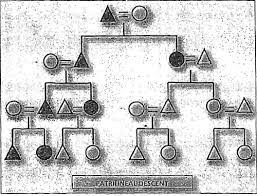Lineage & Descent
Relevant for sociology optional Paper- 1 (Unit- 9 : Sociology- Systems of Kinship)

Lineage and descent are important concepts in sociology that help us understand the ways in which families and communities are organized. Lineage refers to the direct line of descent from a common ancestor, while descent refers to the way in which people trace their ancestry through different generations. These concepts are influenced by cultural, social, and historical factors and play an essential role in shaping the identity and social structure of communities. In this article, we will explore the concepts of lineage and descent in more detail and their significance in Indian society.
In India, lineage and descent are often traced through the male line. This means that the family name and property are passed down from father to son, and the sons are responsible for continuing the family line. This system of patrilineal descent is prevalent in many parts of India, particularly in the rural areas, where the family is the primary unit of social and economic organization. The patrilineal system of descent is also associated with the caste system, which is an important aspect of Indian society.
In the caste system, social status is determined by birth, and people are divided into different castes based on their occupation and social status. Each caste has its own rules and customs regarding marriage, inheritance, and social interaction. The caste system is based on the idea of purity and pollution, and it is believed that marrying outside one’s caste or social status can lead to contamination and impurity. Therefore, lineage and descent are critical in maintaining the purity and social order of the caste system.
In addition to the patrilineal system of descent, there are also other systems of descent prevalent in India, such as the matrilineal system and the bilateral system. In the matrilineal system, descent is traced through the female line, and inheritance and property rights are passed down from mother to daughter. The matrilineal system is prevalent in some parts of India, particularly in the north-eastern states of Meghalaya and Mizoram. The bilateral system of descent is based on the idea that descent is traced through both the male and female lines, and inheritance and property rights are divided equally among all the children.
The significance of lineage and descent in Indian society extends beyond the family structure and the caste system. Lineage and descent are also important in political and economic systems. In many parts of India, political power and authority are based on lineage and descent. Political leaders often come from powerful and influential families, and their positions are passed down through the family line. This can lead to the concentration of power and wealth in a few families, which can have a significant impact on the social and economic development of the country.
Similarly, in the economic system, lineage and descent play a crucial role in determining ownership and control of land and property. Land is a scarce resource in India, and ownership of land is often concentrated in a few families. Inheritance laws and customs often favour male heirs, which can lead to the concentration of wealth and power in a few families.
Despite the significance of lineage and descent in Indian society, there have been efforts to reform and modernize the system. The Indian Constitution prohibits discrimination based on caste, and there are laws in place to ensure that women have equal rights to property and inheritance. There have also been movements to promote gender equality and women’s empowerment, which have challenged the traditional patrilineal system of descent.
In conclusion, lineage and descent are important concepts in sociology that help us understand the ways in which families and communities are organized. In India, lineage and descent are influenced by cultural, social, and historical factors, and they play an essential role in shaping the identity and social structure of communities. The patrilineal system of descent is prevalent in many parts of India and is associated with the caste system, political power, and economic control. While there have been efforts to reform and modernize the system, the traditional system of patrilineal descent and the caste system continue to shape Indian society. Understanding the complexities of lineage and descent is important for creating a more inclusive and equitable society that values and respects the diversity of families and communities. By promoting gender equality, challenging discriminatory customs, and creating opportunities for social and economic mobility, we can work towards a more just and prosperous society in which everyone has an equal chance to succeed.
For more such notes, Articles, News & Views Join our Telegram Channel. https://t.me/triumphias
Click the link below to see the details about the UPSC – Civils courses offered by Triumph IAS. https://triumphias.com/pages-all-courses.php


